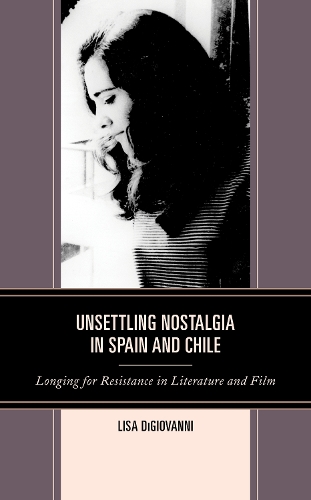
Unsettling Nostalgia in Spain and Chile: Longing for Resistance in Literature and Film
(Hardback)
Publishing Details
Unsettling Nostalgia in Spain and Chile: Longing for Resistance in Literature and Film
By (Author) Lisa DiGiovanni
Bloomsbury Publishing PLC
Lexington Books
8th November 2019
United States
Classifications
Professional and Scholarly
Non Fiction
Media studies
946.081
Physical Properties
Hardback
232
Width 158mm, Height 231mm, Spine 23mm
553g
Description
Unsettling Nostalgia in Spain and Chile: Longing for Resistance in Literature and Film reframes nostalgia to analyze how writers and filmmakers have responded to 20th-century dictatorial violence and loss in Spain and Chile. By reaching beyond reductive definitions that limit nostalgia to a conservative desire to defend traditional power hierarchies, Lisa DiGiovanni captures the complexity of a critically conscious type of longing and form of transmission that she terms unsettling nostalgia. Using literature and film, DiGiovanni illustrates how unsettling nostalgia imbues representations of pre-dictatorial mobilization during the Second Spanish Republic (19311939) and the Chilean Popular Unity (19701973), as well as depictions of clandestine resistance to the Franco dictatorship (19391975) and the Pinochet regime (19731989). Positive memories of efforts to upend power hierarchies coexist with retrospective critiques that fissure romanticized views of revolutionary struggle. Unsettling nostalgic works engender deeper understandings of the complexities of political movements and how stories of resistance are meaningful today. By calling attention to the parallels between nostalgic modes that resist multiple injustices based on gender, class, and sexuality, this book traces an evocative continuity between Spain and Chile that goes beyond the initial work that links forms of militaristic authoritarianism. Scholars of Latin American studies, film studies, literary studies, history, and rhetoric will find this book particularly useful.
Reviews
This book's scope and its position at the intersection of memory and identity make it relevant to several disciplines, including memory studies, women's and gender studies, transatlantic studies, Latin American studies, genocide studies, and film studies....The reader walks away able to recognize various types of nostalgia and the many purposes they can serve, and with an understanding that emotion is an inextricable part of memory and should not be neglected or discarded...DiGiovanni's approach is notable for its intersectionality, generosity, and nuance.
-- "A Contracorriente"Tracing transatlantic connections between the search for social and economic on the parts of Spain during the Second Republic and of Chile under the Popular Unity government, DiGiovanni (Keene State Univ.) explores memory, nostalgia, and narrative. She demonstrates how nostalgia--often viewed as a conservative stance seeking to return to a lost Utopia--can idealize and critique past moments of solidarity and resistance. In the prologue she writes that the term unsettling nostalgia is a "critically conscious type of longing" that can help reclaim the past in order to "inspire new affiliative claims ... while remaining cautious of monologic idealizations," challenging past and present nationalist and patriarchal narratives. In the valuable introduction the author examines theory on memory and nostalgia. The volume's six chapters focus on novels, film, and documentaries from 1996 through 2006, including Roberto Bolao's Estrella Distante, Dulce Chacn's La voz dormida, Roberto Brodsky's Ultimos das de la historia, Almudena Grandes's El corazn helado and El lector de Jules Verne, and work by Carmen Astudillo and Carmen Castillo. This engaging study explores nostalgia as a tool to create community, linking generations in the construction of identity and demonstrating the way nostalgia for past revolutionary projects informs present struggles. Summing Up: Recommended. Lower-division undergraduates through faculty.
-- "Choice Reviews"Author Bio
Lisa DiGiovanniis associate professor of Spanish Peninsular and Latin American studies with a joint appointment in the Department of Modern Languages and Cultures and the Department of Holocaust and Genocide Studies at Keene State College.
